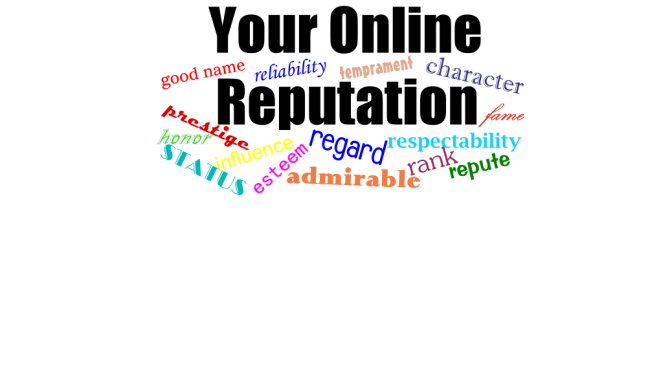“It’s 2014, and networking isn’t your grandfather’s game of handshakes and highballs anymore. Your online footprint matters as much as, if not more than, your real-life presence. Just as there are certain faux pas to avoid with in-person networking, you can botch online networking if you aren’t careful, says serial entrepreneur Matthew Toren. For example, you should expect potential business associates to look you up online, which allows them to find your social media accounts, blog posts and anything others have written about you. “If what they find doesn’t give them the right impression, you’re not likely to make the connection you want,” Toren says.
He recommends a tool such as BrandYourself to push negative search-engine results to the bottom and bring positive results to the top. What if your online reputation is truly stained? “It’s worth hiring a reputation management firm to clean it up,” Toren says. “It takes time, and it isn’t cheap, but it can be worth it.” More: 5 Online Faux Pas That Will Doom Your Networking Potential
Begin structuring your work week.
If you aren’t planning out your work weeks, then you probably aren’t making the best use of your time. You may find yourself spending long hours — longer than necessary — at your desk, says Adam Toren, co-founder of YoungEntrepreneur.com. While various gurus have developed competing systems for maximizing one’s efficiency, the common denominator, Toren says, is “a structured methodology to achieving goals.” How can you ease into it? “Start with a weekly planning session, then layer in maximizing the use of virtual assistants,” Toren says. “In a month’s time, commit to spending 10 minutes a week reflecting on the successes (and missed opportunities) of the past week. Before you know it, you’ll have an approach to addressing the work week.”
Dress like you mean business, even when working from home.
When working from home, it’s tempting to sit around in sweats for comfort, but you should resist the urge, says Jim Joseph, the North American president of New York-based communications agency Cohn & Wolfe. You don’t need to put on business formal, but you should look put-together in clothes that reflect your identity and what you do for a living. You will be glad you did when you make a run to the coffee shop or post office. Also, you never know when a potential client or collaborator might want to jump on Skype to chat, and you may not have time to make yourself presentable. More importantly, says Joseph, “Getting dressed puts you in a mindset of personal success. It helps motivate you to be productive and puts your head into play. If you sit around in your PJs all day, then you’ll be less likely to get into your game, and probably less likely to interact with all those people who may be able to help you.” More: Forget PJs, Dress Your Brand Even at Your Home Office
Do away with meetings.
All-hands meetings tend to be long and that time costs money. “To calculate the precise cost, multiply the hourly wage of each person present by the length of the gathering,” says Jacqueline Whitmore, an etiquette coach and the author of Poised for Success: Mastering the Four Qualities That Distinguish Outstanding Professionals (St. Martin’s Press, 2011). The good news is that many lengthy meetings are unnecessary. Your objectives can often be met “through e-mail, conference call, Skype or even a quick one-on-one discussion,” she says.
Craft a narrative to carry your message.
Many people have trouble with public speaking. One way to become an excellent public speaker is to avoid boring your audience by telling a story, says Stephen Key, an author, speaker and entrepreneur. No matter how dry your subject is, you can enliven your speech by giving it the form of a story. “Storytelling is an incredibly powerful medium,” Key says. “If you tell a story, it will be easier for people to focus on your message and your audience will have something to walk away with.” One of the differences between a story and a lecture is that a story has a discernible beginning, middle and end. Craft a narrative for your audience to follow, and use that narrative as the vehicle for your message. – BY BRIAN PATRICK EHA
Read more: http://www.entrepreneur.com/article/230624#ixzz2pO1K6YV5 ”
If you aren’t sure exactly what blogging can do for you, then I HIGHLY recommend that you take just a few minutes, and watch this Overview Video that explains more about how this program works.
As soon as you join, even if you start with just
the $25 blogging system, I will personally contact you &
email you access to our SECRET Facebook Mastermind Group and team website where you can communicate directly with me and start learning this business right away.
The tools are there,
The team is there,
The results are there,
The only thing you need is your action
Either way we are growing with or without you,
but we would much rather take you with us!
So CLICK THIS LINK and get started now.
Dedicated to your success, because I believe in you!
Stuart Springfield








